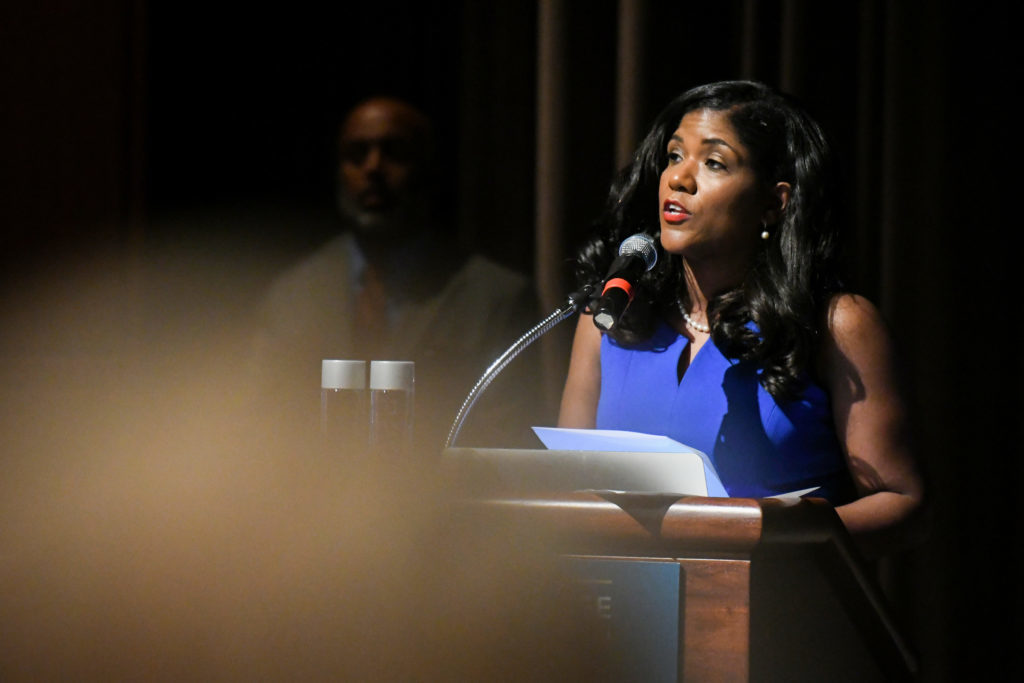For the first time in its three years of existence, the University’s Diversity Summit will be held in the fall.
The two-day summit, which includes workshops, panels, lectures and presentations focused on diversity and inclusion, will be held on Nov. 1 and 2 after three years of spring conferences. Officials said the move will allow students to engage in activities about diversity and inclusion earlier in the academic year, prompting conversations that could continue through the rest of the academic year.
The move comes on the heels of the first-ever diversity training for incoming freshmen after a racist Snapchat incident in February prompted a campus-wide call from students and officials to create a more inclusive campus.
Caroline Laguerre-Brown, the vice provost for diversity, equity and community engagement, said the diversity summit was moved to the fall to open up more educational conversations about diversity and inclusion as soon as the year begins. During the summit, student groups and officials can listen to keynote speakers and participate in educational workshops, she said.
Laguerre-Brown said since announcing the fall date, officials have advertised the summit by reaching out to student organizations and through the University’s Infomail, social media and newsletters from the Nashman Center for Civic Engagement and Public Service and Multicultural Student Services Center.
“We look forward to seeing our community gather together in November to engage in critical, thoughtful and challenging dialogue to inform how we understand ourselves, the larger landscape of higher education and ways to continue building an inclusive campus climate,” she said in an email.
Student organizations can submit proposals to officials outlining issues they want to be included in the summit’s schedule until Thursday. Staff in the Office for Diversity, Equity and Community Engagement will review the proposals and send responses to each student group on Oct. 18.
Student Association President Ashley Le said by hosting the summit in the fall, more students may attend because the semester isn’t yet heavily focused on securing internships or study abroad programs and post-graduation jobs for seniors.
Le, who is attending the summit, said the SA will promote the event in the group’s weekly email blasts and on its social media and website.
“I think it’s important to think about students’ busy schedules, particularly in the spring semester,” Le said in an email. “Having the diversity summit in the fall this year can help to increase participation.”
Multicultural student organization leaders said while the move gave student groups less time to submit a proposal, hosting the summit earlier in the academic year gives a larger platform for diversity-related topics and can help expose freshmen to the subject.
Victoria Lewis, the president of GW Interfaith Council, said moving the summit earlier in the year gave the organization less time to plan a proposal for the summit. Lewis said last year, the organization met multiple times throughout the year and talked with other student leaders about proposals, which have in the past included conversations about encouraging international students to pursue leadership positions or the role of gender bias in the classroom.
Students in GW Interfaith Council this year submitted a presentation called “The Importance of Religious Diversity in Higher Education,” a discussion on how religion could be incorporated into the classroom, she said.
Lewis added that student turnout at the summit could rise because the University is increasing outreach and advertising toward student groups.
“They’re advertising the diversity summit a whole lot more this year, so I think that that will also really help with turnout,” Lewis said. “Having a whole day that you can focus on issues of diversity and inclusion is definitely what we need.”
Manahil Hassan Kazmi, the president of the Pakistani Students Association, said the summit’s move to the fall was a “very good decision” for incoming freshmen, especially because the incoming class was the largest in recent history and includes a “plethora of different ethnic and religious backgrounds.”
She said the summit is important for GW to showcase itself as “diverse and inclusive” for freshmen to set a precedent that “no one feels left out because of their race, color or religion” while they’re still adjusting to campus.
Hassan Kazmi said the group is attending the summit and is currently developing a proposal.
“It’s very important to make sure that the new students, who are already a little disoriented due to a change of environment, feel welcome and included in their new surroundings,” she said.
Sarah Roach contributed reporting.





